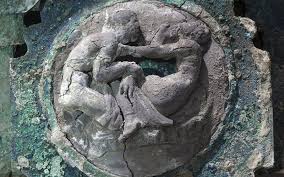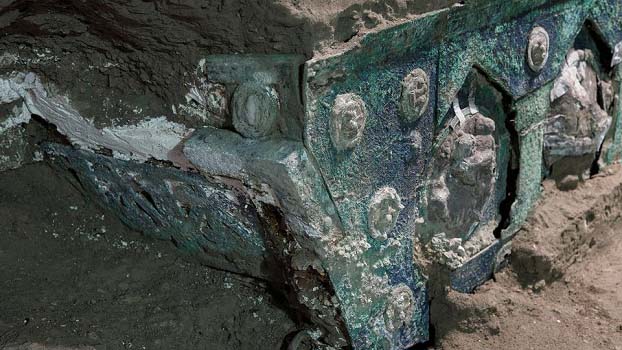Italy: Pompeii discovers ancient processional carriage

Pompeii: The Pompeii archaeological park has announced the discovery of an ancient four-wheeled processional carriage, believed to have been used for an “artistocratic wedding ceremony,” reports Italian news agency ANSA.
The discovery has been described as of “very great importance in advancing our knowledge of the ancient world,” by outgoing Pompeii director Massimo Osanna, who told ANSA that the carriage may be a ‘Pilentum’, a vehicle used by the elites and only on ceremonial occasions.
“We had never seen one like this in Italy before” – Osanna said – “It can only be compared with a series of carriages found 15 years ago in a tomb in Thrace, in northern Greece, on the border with Bulgaria.”

The find was made a few days ago during excavations at the suburban villa of Civita Giuliana near Pompeii which, last November, saw the discovery of the bodies of two men, possibly a master and his slave.
Mystery surrounds the carriage which is painted in red and covered in intricate bronze and tin medallion decorations “of an erotic nature,” according to ANSA.
“We found the imprints of ears of wheat on the hardened ash taken from one of the two seats,” said Osanna.
This detail, he explained to ANSA, could point to the cult of Ceres, who was honoured at Pompeii together with Venus, and therefore “the presence in the villa of a priestess of these cults.”
However Osanna also said the wheat sheaves on the seat might represent a fertility augury and “could be evidence of a marriage celebrated shortly before, or which was ready to be celebrated.”
In addition to exploring “one of the most significant villas of the Vesuvian area,” the excavation project at Civita Giuliana is designed to bring an end to the pillaging of cultural heritage by tomb raiders who had dug an illegal network of tunnels in the area, according to the Pompeii archaeological park.
Pompeii has made the news several times in the last week, with the unveiling of the restored garden fresco in the Casa dei Ceii and the appointment of Gabriel Zuchtrigel to succeed Osanna.





